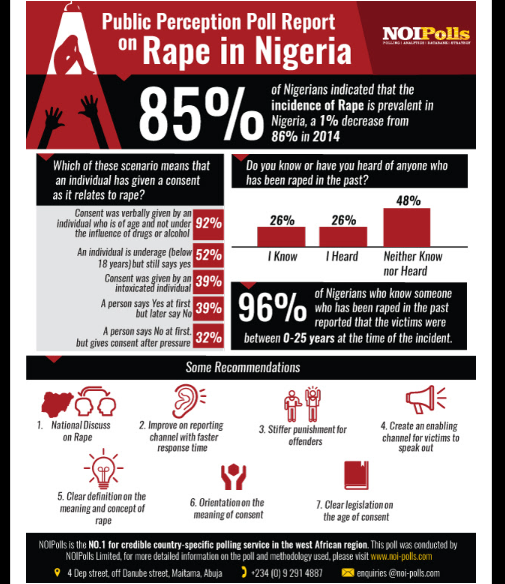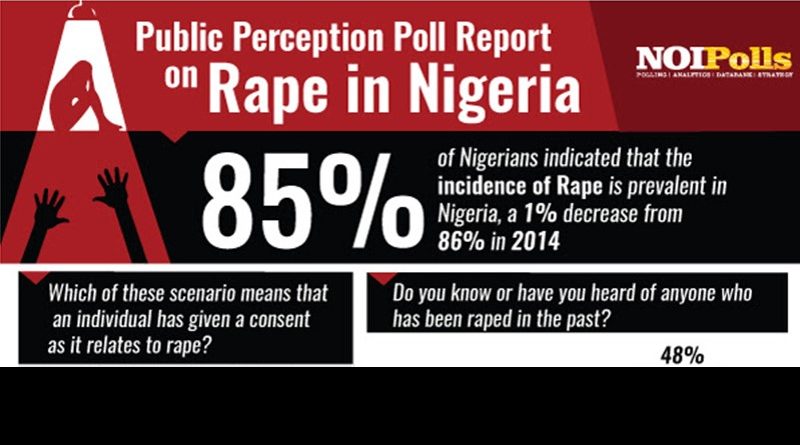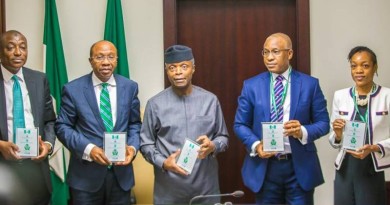Public Perception Poll Report on Rape in Nigeria – NOIPOLLS
A new public opinion poll conducted by NOIPolls has revealed that most Nigerians (85 percent) believe that the issue of rape is prevalent in the country. In 2017, the Nigerian Senate passed a motion to investigate the increasing incidence of rape and sexual assault across the country. And, on July 9th, 2019, the legislators began considering death penalty for rape offenders as they deliberated on a motion “Sexual abuse in Nigeria: a growing scourge” sponsored by Senator Rose Oko, representing Cross River North in Cross River State, and 10 other senators.
The poll results further revealed that a larger proportion (62 percent) of the respondents stated that rape is coercing someone to have sex or perform a sexual act only by means of physical force or a deadly weapon. On the definition of consent, a majority (92 percent) of the respondents identified that consent as it relates to rape is one which is given verbally by an individual who is of age and not under the influence of drugs or alcohol. However, it is worrisome to note that 52 percent of Nigerians also believe that consent can be given by an individual who while underage (below 18 years) but still says yes. It is worthy to note that under the Nigerian Criminal Code, sexual intercourse with under aged individuals or individuals with unsound mind is the offence of defilement, and so technically a person could be charged for rape and defilement.

About 3 in 10 Nigerians (26 percent) disclosed that they know someone who has been raped in the past and the rape victims were particularly minors and young adults aged between 1 – 15 years (72 percent) and 16 – 25 years (24 percent) respectively. This statistic implies that one in every three girls would have experienced at least one form of sexual assault by the time they reach 25 years. According to the respondents, offenders were mostly strangers (38 percent), while neighbours (24 percent), acquaintance of the victims (18 percent) and relatives (16 percent) accounted for the other categories of offenders. Further probing revealed that most of the rape incidence happened either at the victim’s residence (36 percent) or at the offender’s residence (24 percent).
There are perceptions that rape cases have been under-reported especially to the Police, findings showed that slightly more than half (53 percent) of the respondents mentioned that rape incidence were reported to the Police. Out of this proportion, 67 percent acknowledged that the offenders were arrested, while 33 percent claimed that the offender was not arrested. This implies that about 3 in 10 perpetrators of this atrocious crime often don’t face the drum or the dictates of the law against the crime even when reported to the police. Comparing the results of this pole with an earlier poll conducted in 2014 show a 25 percent decline in the proportion of Nigerians who reported rape incidence to the Police. This may suggest that Nigerians are not satisfied with the level of prosecution of rape offenders in the country when reported to the Police. Nonetheless, the Police Public Relations Officer, Mr. Frank Mba, during an exclusive interview with The Guardian News media in Abuja on July 13, 2019, assured Nigerians that the Police and the State owe victims of rape the responsibility to diligently investigate the complaint and bring offenders to book. Sadly, 8 percent of Nigerians disclosed that the incidence was not reported to the police and this was majorly due to fear of stigmatization (46 percent), victim’s family chose not to report (17 percent), thought that the Police may not take the incident seriously (7 percent) and belief that the Police may fail to solve the crime (5 percent) amongst other reasons.
Curiously, Nigerians blamed the incidence of rape mainly on indecent dressing (47 percent), excess intake of alcohol by the offenders (36 percent) and victims (34 percent) and promiscuity (34 percent). In terms of justice, Nigerians mostly advocated life imprisonment (37 percent), death penalty (22 percent) and prosecution (20 percent) for offenders of rape in the country. In addition, a larger proportion (41 percent) of Nigerians from the poll recommended that offenders of rape should be punished considering that some of the offenders elude the wrath of the law. Also, 19 percent suggest that there should be more awareness campaign on the dangers of rape to help reduce the increasing trend of rape in the society. It is therefore important that concerned stakeholders’ and the government, particularly the National Orientation Agency, work together to find the most effective way of implementing and disseminating greater awareness campaigns on the dangers as well as the consequences of rape and to reinforce the government’s commitment to end the scourge.
Background and Objectives
Rape is a social problem of public health concern worldwide. It is a violation of the rights of victims irrespective of gender though, mostly committed against girls/women. It is a form of sexual violence in which sexual activity is unwanted, non-consensual and with application of physical force, threat or verbal intimidation of the victim. It is a brutal form of violation of the right of an individual which has been condemned worldwide.
Nigeria is not an exception as it is regrettable that citizens believe that the prevalence of rape is on the rise. An individual who has been raped faces a lot of social, medical and psychological problems. For instance, genital tract traumas could lead to bleeding, fistulas; abnormal vaginal discharges, sexually transmitted infections like HIV/AIDS, unwanted pregnancies which may result to unsafe abortions as well as sexual disorders and mental illnesses amongst other negative effects. This is in addition to the social stigma that accompanies being identified as a rape victim.
Rape offenders are usually strangers, family members, friends, acquaintances, supervisors and even religious leaders. However, it is unfortunate that most cases of rape are under-reported mainly due to fear of stigmatization, the intent to protect the victims, belief that the police may fail to solve the crime as well as considering the low rate of prosecution of offenders by the Police. The laws in Nigeria against rape have not been implemented fully against offenders thereby paving way for the continuation of rape in the country. Against this background, NOIPolls conducted this survey to assess the perceptions of Nigerians regarding the prevalence of rape, possible causes as well as various ways to curb it.
Survey Methodology
The survey was conducted through telephone interviews in the week of July 8th, 2019. A proportionate random nationwide selected sample of 1,000 phone-owning Nigerians, 18 years and above, were interviewed across the six geopolitical zones in the country using a well-structured questionnaire. This sample size provides a 95% confidence interval that the results obtained are within a range of plus or minus 4.65% of the opinions of population. The interviews were conducted in English, Pidgin, Hausa, Igbo or Yoruba. The use of several Nigerian languages reduces the likelihood of a non-response bias.
HERE IS AN EXCERPT FROM THE RESULTS OF THE RAPE POLL
Perceptions on The Meaning of Consent As it Relates to Rape
The poll sought to explore the scenarios that confirm the consent of an individual as it relates to rape. Respondents were asked specifically which of these scenarios mean that an individual has given consent. Analysis of results revealed that majority (92 percent) of the respondents stated that consent is given if an individual who is of age and not under the influence of drugs or alcohol verbally says yes’ and this assertion cuts across gender, geo-political zones and age-groups.
Other scenarios that confirms that an individual has given consent to a sexual act according to Nigerians are: when ‘an individual who is underage (below 18 years) but says yes to a sexual act’ (52 percent), when consent was given by an intoxicated individual (39 percent), when ‘someone says yes at first but later says no’ (39 percent) among other mentions as well as when ‘someone says no at first but gives consent after pressure’ (32 percent).

Perceptions on The Prevalence of Rape in Nigeria
Furthermore, the poll gauged the opinion of Nigerians nationwide regarding the prevalence of rape in the Nigeria. And findings revealed that 85 percent (57 percent + 28 percent) of Nigerians stated that rape is prevalent in Nigeria. Analysis across geo-political zones shows that the North-West zone (92 percent) had the highest share of respondents who stated that rape is prevalence in Nigeria. This is closely followed by the South-West at 91 percent. Interestingly, 32% of residents in the North-East zone did not think that rape is prevalent in Nigeria.

Knowledge and Perception of Rape Incidence in Nigeria
Our poll revealed that about 3 in 10 Nigerians (26 percent) confirmed that they know someone that has been raped in the past. The North-West (38 percent) and North-East (34 percent) zones accounted for the largest proportion of Nigerians in this category.
Additionally, 26 percent of respondents who claimed that they do not know anyone that has been raped in the past have heard someone who has been raped in the past. This brings it to an alarming total of 52 percent of respondents who are aware of a rape incident/victim. Analysis by geo-political zones shows this proportion to be highest in the North-West zone (76 percent) followed by the North-Central (54 percent) and lowest in the South-West zone (30 percent).

Victim’s Age Group
Respondents who acknowledged that they know some who has been raped in the past were further probed on the age group of the victim. The result indicated that majority of the victims were between 0 – 15 years (72 percent) and 16 – 25 years (24 percent) respectively. Analysis by geo-political zone showed that while the North-West zone had the largest proportion (80 percent) of Nigerians who mention 0 – 15 years, the residents in the South-West zone accounted for the highest number of Nigerians who stated 16 – 25 years.

Reporting Channels
It is often perceived that the incidence of rape is often under reported in Nigeria. Nonetheless, the poll result showed that slightly more than half of the respondents (53 percent) stated that the rape incidence was reported to the Police. The North-East zone (70 percent) had the largest proportion of respondents in this category. 20 percent specified that some of the incidence was reported to the victim’s parent/guardian, while 8 percent said that it was reported to the victim’s relative amongst other mentions. Remarkably, 8 percent of the respondents disclosed that the incidence was not reported and this assertion is mostly predominant in the North-Central zone (18 percent).

Perceived Reason Rape Case Was Not Reported to the Police
Respondents who did not report the incidence to the Police were further probed and the findings revealed that they did not report to the Police majorly because of fear of stigmatization (46 percent). This is followed by respondents who said that the victim’s family chose not to report the case (17 percent), while 14 percent were scared of being blamed. It is worthy to note that 8 percent did not report to the Police because they thought that the Police may not take the incidence seriously. Also, 5 percent also believed that the Police may fail to solve the crime.

Perceived Causes of Rape in Nigeria
Perceptions on possible causes of rape in Nigeria revealed that the incidence of rape is mostly blamed on indecent dressing (47 percent), excess intake of alcohol by both the offenders (36 percent) and victims (34 percent) as well as promiscuity as stated by 34 percent of the respondents amongst several causes mentioned.

Perceived Punishment for Rape Offenders in Nigeria
According to the respondents, the top three punishment for offenders of rape are life imprisonment (37 percent), death penalty (22 percent) and prosecuting offenders. Other punishment cited includes keeping offenders in rehabilitative custody (7 percent), psychological examination (6 percent), lashing offenders (3 percent) amongst others.

Recommendations
In terms of suggestions to curb the incidence of rape in Nigeria, the three top recommendations are punishing offenders (41 percent), creating awareness on the dangers of rape (19 percent) and dressing decently (13 percent) amongst several other recommendations.

Conclusion
In conclusion, the poll having examined the prevalence of rape in Nigeria, attitudes towards reporting incidence of rape and the persecution of rape offenders in Nigeria. It was found that that cases of rape in Nigeria is highly prevalent across Nigeria. Alarmingly, trends on the prevalence of rape showed that only a marginal 1 percent decline has been recorded in the fight against the prevalence of this atrocious crime between 2014 and 2019. Hence, this menace is still a major challenge in Nigeria. Alarmingly, the poll found out that Nigerians considered consent from a minor (less than 18 year) as well as consent from an intoxicated individual as valid consent for sexual activity.
Also, this study shows that rape cases are still under reported in Nigeria for reasons such as fear of stigmatization and lack of persecution of offenders by the law amongst other reasons. These two scenarios may likely encourage offenders to perpetrate more of such crimes and may also be the reasons for the poor success recorded in the fight against rape thus far; despite efforts by several government agencies and civil society organizations to mitigate this crime. Hence, the study recommends that if this crime must be mitigated, a nationwide advocacy be carried out by civil society organizations and government agencies that deals with gender issues and sex related crimes. To encourage victims to report rape incidences as get the law to persecute rape offenders and get justice for victims. There is also a huge need on the orientation of Nigerian on the meaning of consent.
NOIPolls




